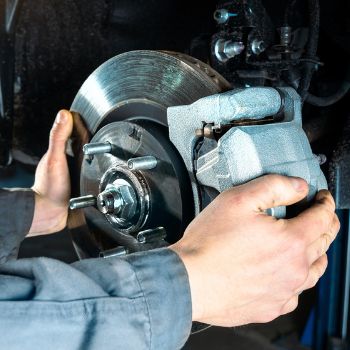What Can Happen When You Ride the Brakes?
One common mistake many drivers make is "riding the brake"—keeping their foot on the pedal for too long. This habit not only speeds up wear and tear but also puts unnecessary stress on your entire braking system. Over time, this can lead to costly repairs or even dangerous situations. Whether your car uses disc or drum brakes, the basic principle is the same. When you push the brake pedal, hydraulic pressure forces the brake pads against the rotors (or drums), creating friction that slows down your vehicle. This process happens every time you stop, and with each application, the pads gradually wear down. Heat is a natural byproduct of this friction. Normally, air flowing over the rotors helps cool them down. However, if you're constantly applying the brakes, especially on hills, the system doesn’t have a chance to cool properly. This leads to overheating, which can cause fluid to boil and components to degrade faster. Continuously holding down the brake pedal can lead to several issues: Additionally, riding the brake can be confusing for other drivers and reduce fuel efficiency. It also makes driving downhill more dangerous, as you lose control over your speed and increase the risk of an accident. If you often drive in hilly areas, using lower gears can help reduce the need to constantly apply the brakes. Here are some tips to protect your braking system: During winter, when roads are icy or snowy, you might need to use the brakes more carefully. Maintain a safe distance from the car ahead and apply gentle, steady pressure to keep a controlled speed. If your car starts to slide, the ABS will activate to help you steer safely. Don’t ignore signs of brake wear. If you notice unusual noises, a spongy brake pedal, or longer stopping distances, it’s time to get your system checked. At DaSilva’s Auto Body, our experienced technicians can inspect your brakes, identify any issues, and recommend the right repairs or replacements. Schedule an appointment at our Naugatuck location today to ensure your brakes are always in top condition. Your safety—and the safety of others—depends on it.
Tert-Butyl peroxybenzoate (TBPB) a chemical compound from the group of peresters. It is often used as a radical initiator in polymerization reactions, such as the production of LDPE from ethylene, and for crosslinking, such as for unsaturated polyester resins.
TBPB is a low volatility ,high purity,liquid, aromatic peroxuester.it is effective as medium of a broad spectrum of monomers e.g .styrene.ethylenn,acrylics.it is also used to cure (copolymerzation) unsaturated resins .
TBPB is a clear light yellow liquid, which is little soluble in water but well in many organic solvents such as ethanol or phthalate.
As peroxo compound, TBPB contains about 8.16 wt% of active oxygen and has a self accelerating decomposition temperature (SADT) of about 60 °C. The SADT is the lowest temperature at which self-accelerating decomposition in the transport packaging can occur within a week, and which should not be exceeded while storage or transportation.[2] TBPB should therefore be stored between minimum 10 °C (below solidification) and maximum 50 °C. Dilution with a high-boiling solvent increases the SADT. The half-life of TBPB, in which 50% of the peroxy ester is decomposed, is 10 hours at 104 °C, one hour at 124 °C and one minute at 165 °C. Amines, metal ions, strong acids and bases, as well as strong reducing and oxidizing agents accelerate the decomposition of TBPB even in low concentrations.[ However, TBPB is one of the safest peresters or organic peroxides in handling. The main decomposition products of tert-butyl peroxybenzoate are carbon dioxide, acetone, methane, tert-butanol, benzoic acid and benzene.
98%Tert-Butyl Peroxy Benzoate,98%Tert-Butyl Peroxy Benzoate Compound,98%Tert Butyl Peroxy Benzoate,98%Tert-Butyl Peroxy Jiangxi Zhewei Material Technology Co.,Ltd , https://www.jxzwchem.com Your car’s braking system is more than just a component—it's a vital part of your safety on the road. From the moment you press the pedal, the brake system works hard to bring your vehicle to a stop. But improper use can lead to serious problems.
Your car’s braking system is more than just a component—it's a vital part of your safety on the road. From the moment you press the pedal, the brake system works hard to bring your vehicle to a stop. But improper use can lead to serious problems.How Your Brakes Actually Work
The Risks of Riding the Brake
Smart Alternatives to Riding the Brake
